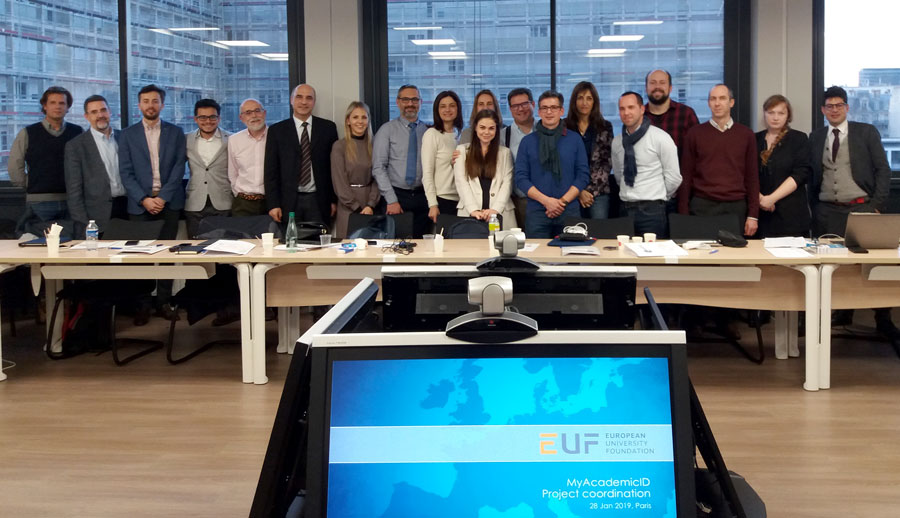Since January 2019, the portfolio of Trust and Identity activities within GÉANT has a new addition: MyAcademicID. On behalf of the NRENs, GÉANT, RENATER and SUNET participate in the project, which is led by the European University Foundation (EUF).
The aim of MyAcademicID is to define a European student eID scheme that will allow students to register and authenticate themselves electronically at higher education institutions when going abroad, manage their Erasmus mobility process electronically, and access various student services in Europe (and beyond).
Digital infrastructure
The digital infrastructure supporting the European Student eID for Higher Education that is being explored in the MyAcademicID project will result from work done in the European Student Card project (ESC, led by Cnous) and eIDAS, the e-Gov eID interoperability framework being rolled out by the European institutions, and the integration of eduGAIN. The ECS project, together with Erasmus Without Paper and EMREX projects, is part of the European Student Card Initiative, launched by the European Commission “to enable every student to easily and safely identify and register themselves electronically at higher education institutions within the EU when moving abroad for studies, eliminating the need to complete on-site registration procedures and paperwork”.
Although the Erasmus programme has existed for nearly three decades and has undergone a monumental expansion (from 11 participating countries and around 3,000 students in 1987, to 33 participating countries and more than 9 million people having benefited from mobility under Erasmus by 2017), the procedures in place have remained largely paper based – until recently. To that end, the European Commission funded a project to develop core tools to move towards a paperless process for student mobility exchange (i.e. Erasmus Without Paper). This is in line with the European vision for a European Education Area, which foresees that, by 2025, all students in Europe should be able to have their student status recognised automatically across EU member states and higher education institutions, including access to campus services when going abroad.
Strategic
MyAcademicID is a rather small project in size, but it is very important strategically for all involved parties as it offers a concrete opportunity to expand eduGAIN to support Erasmus projects. (After all, wouldn’t it be great if applications for student mobility under the Erasmus programme could be automated and if federated access was used?) And it allows for interoperability between eduGAIN and eIDAS – the latter which has been on the GÉANT and eduGAIN agenda for some years.
To date, very few universities in Europe support national eIDs for student authentication, but most of them (more than 2600) are members of the national research and education federations and are in eduGAIN. Via MyAcademicID and with the support of SUNET (which is operating the eIDAS Swedish node and will support the technical pilot), services in eduGAIN will be able to consume e-identities provided via eIDAS when they become more widely deployed. For eduGAIN purposes, eIDAS nodes will appear as IdPs; for eIDAS purposes, service providers from eduGAIN will appear as service providers for academic services.
Progress
Beside the project meetings, there have been three technical workshops organised by GÉANT, which were useful for all parties to better understand the whole ecosystem: namely to detail the Erasmus use-cases, to identify the candidate Erasmus Without Paper services that would become available via eduGAIN, to understand the technical aspects of the European Student Card project, and to discuss how eduGAIN and eIDAS work. The workshops allowed the technical team led by GÉANT to work on a blueprint architecture that (i) would enable federated access for the selected Erasmus services and (ii) allow for these services to also consume eIDAS credentials.
The student card developed under the ECS project enables identification of a student but not authentication. This is, however, very useful for a number of services that require the identification of student, but which do not require authentication, e.g. student cafeteria, access to libraries, etc. France is one of the pioneer countries in this area.
During the workshops the team worked on the requirements of the Erasmus Without Paper (EWP) services and consequently on the high-level architecture concept. As part of this work, we identified that all EWP services have a need for a common identifier in order to support the student mobility processes.
The ESC project has already defined such an identifier, the European Student Identifier (ESI), which is currently being deployed by the universities that have adopted the European Student Card. The ESI resembles the IBAN format. It is comprised of four components: the country code, an optional regional code, the PIC number of the university, and the local student identifier at the given university. One of the shortcomings of this approach is that it relies on the PIC numbers, which will be replaced by the European Commission in the near future. At the same time, identity providers supporting the Research and Scholarship entity category do release user identifiers, but usually these identifiers are not related with local student identifiers used in the student management systems. During the discussions more questions were raised: can we use the identifier from the schac schema? Could we replace the PIC number with the schacHomeOrganization value and use the ESI format?
More discussion is needed to move forward and scale MyAcademicID up, but something that is clear is that in order to move towards a paperless process that supports student mobility, we need a student identifier that can be shared across the EWP services and higher education institutions in Europe. Of course these options need further discussion beyond the remit of MyAcademicID.
What’s next?
GÉANT and EUF are preparing a webinar that will take place on the 9th of July to present the Erasmus+ programme and to provide an overview on MyAcademicID project.
Further work on finalising the blueprint architecture for MyAcademicID will continue; a first draft is expected in July 2019. The first integration results are expected in November 2019.
MyAcademicID project is organising a conference to discuss the digital development of students’ mobility and academic records; the event will take place on the 20th and 21th of November in Berlin. Find out more on MyAcademicID website.
MyAcademicID project was also presented during the workshop “NRENs and Educational Technology” that took place on Monday 18 June during TNC19.
ABOUT MyAcademicID project
MyAcademicID is co-funded via the European Commission’s Connecting Europe Facility (CEF) programme and will last for 18 months, from January 2019 until June 2020. The project is led by the European University Foundation (EUF) which also coordinates the Erasmus Without Paper project aiming to digitise the core Erasmus processes and procedures.
GÉANT leads two of the five work packages in the project: the definition of the blueprint and the initial implementations of blueprint; SUNET is involved mostly in the work package concerned with implementation aspects whilst RENATER supports the design phase and contributes to the implementation work.
Other partners are: Centre national des œuvres universitaires et scolaires (Cnous), Humboldt-Universität zu Berlin (UBER); University of Malaga (UMA); Direção-Geral do Ensino Superior (DGES); Fondazione ENDISU; Aristotle University of Thessaloniki (AUTH); Deutsches Studentenwerk (DSW); Ente per il Diritto allo studio Universitario dell’Università Cattolica (EDUCatt); and Direction Interministérielle du Numérique et des Systèmes d’Information et de Communication de l’état (DINSIC).
Do you want to know more ? Contact Christos Kanellopoulos and/or Licia Florio.








Add Comment